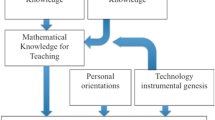Abstract
Among the initiatives of the Maryland Collaborative for Teacher Preparation (MCTP) is a summer research internship program that places preservice middle grades teachers in extended collaboration with professional mathematicians, scientists, and educators engaged in research and curriculum development activities. We describe the MCTP internship program including the rationale for and structural features of the program. We also highlight the effects of the internship experience on preservice teachers' conceptions of and beliefs about the nature and processes of mathematics and science, and the teaching of mathematics and science. Our findings suggest that the internship experience is a fundamentally significant life experience for preservice teachers. Furthermore, internships have the potential for realizing reform in mathematics and science education; that is, preservice teachers who have participated in MCTP internships intend to bring a holistic, conceptually oriented view of mathematics and science to their classrooms. The paper concludes with a summary of ongoing programmatic and logistical challenges of the MCTP internship program.
Similar content being viewed by others
REFERENCES
American Association for the Advancement of Science (1990). Science for all Americans. New York: Oxford University Press.
American Association for the Advancement of Science (1993). Benchmarks for science literacy. New York: Oxford University Press.
Bogdan, R.C., & Biklen, S.K. (1992). Qualitative research for education: An introduction to theory and methods (2nd ed.). Boston, MA: Allyn and Bacon.
Brown, C.A., & Borko, H. (1992). Becoming a mathematics teacher. In D.A. Grouws (Ed.), Handbook of research on mathematics teaching and learning (209-239). Reston, VA: National Council of Teachers of Mathematics.
Brown, J.S., Collins, A., & Duguid, P. (1989). Situated cognition and the culture of learning. Educational Researcher, 18(1), 32-42.
Brown, S.I, Cooney, T.J., & Jones, D. (1990). Mathematics teacher education. In W.R. Houston, M. Haberman & J. Sikula (Eds.), Handbook of research on teacher education (639-656). New York: Macmillan.
Fennema, E., & Loeff, M. (1992). Teachers' knowledge and its impact. In D.A. Grouws (Ed.), Handbook of research on mathematics teaching and learning (147-164). Reston, VA: National Council of Teachers of Mathematics.
Fey, J. (1998). Guiding principles: New thinking in mathematics and science teaching. In M. Gardner & D. Ayres (Eds.), Journeys of transformation: A statewide effort by mathematics and science professors to improve student understanding (11-21). College Park, MD: The Maryland Collaborative for Teacher Preparation.
Grouws, D.A., & Schultz, K.A. (1996). Mathematics teacher education. In J. Sikula, T.J. Buttery & E. Guyton (Eds.), Handbook of research on teacher education (2nd ed.) (442-458). New York: Macmillan.
Kennedy, M.M., Ball, D.L., & McDiarmid, G.W. (1993). A study package for examining and tracking changes in teachers' knowledge (Technical Series 93-1). East Lansing, MI: National Center for Research on Teacher Education.
LeCompte, M.D., & Preissle, J. (1993). Ethnography and qualitative design in educational research (2nd ed.). San Diego, CA: Academic Press.
McIntyre, D.J., Byrd, D.M., & Foxx, S.M. (1996). Field and laboratory experiences. In J. Sikula, T.J. Buttery & E. Guyton (Eds.), Handbook of research on teacher education (2nd ed.) (171-193). New York: Macmillan.
Miles, M.B., & Huberman, A.M. (1994). Qualitative data analysis (2nd ed.). Thousand Oaks, CA: Sage.
National Council of Teachers of Mathematics (1989). Curriculum and evaluation standards for school mathematics. Reston, VA: Author.
National Council of Teachers of Mathematics (1991). Professional standards for teaching mathematics. Reston, VA: Author.
National Research Council (1996). National science education standards. Washington, D.C.: National Academy Press.
Shulman, L.S. (1986). Those who understand: Knowledge growth in teaching. Educational Researcher, 15(2), 4-14.
Thompson, A.G. (1992). Teachers' beliefs and conceptions: A synthesis of the research. In D.A. Grouws (Ed.), Handbook of research on mathematics teaching and learning (127-146). Reston, VA: National Council of Teachers of Mathematics.
Wertime, R. (1979). Students, problems and "courage spans." In J. Lochhead & J. Clement (Eds.), Cognitive process instruction: Research on teaching thinking skills (191-199). Philadelphia, PA: Franklin Institute Press.
Author information
Authors and Affiliations
Rights and permissions
About this article
Cite this article
Langford, K., Huntley, M.A. Internships as Commencement: Mathematics and Science Research Experiences as Catalysts for Preservice Teacher Professional Development. Journal of Mathematics Teacher Education 2, 277–299 (1999). https://doi.org/10.1023/A:1009954603753
Issue Date:
DOI: https://doi.org/10.1023/A:1009954603753




